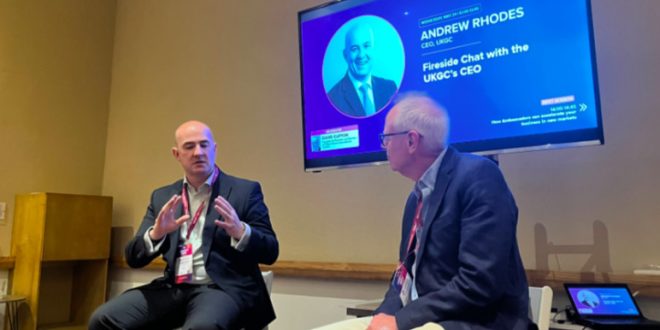Andrew Rhodes has shed light on the imminent future of British gambling and how the UK Gambling Commission (UKGC) is ready to implement the changes of the White Paper following its final consultation phase.
The headline speaker of Day-1 of The CasinoBeats Summit in Malta, Rhodes was interviewed by Licensing Expert David Clifton as he reflected on his tenure to date as Chief Executive of the Gambling Commission, taking full leadership responsibilities exactly one-year ago.
A veteran officer of the Civil Service, Rhodes admitted that he “underestimated how politically conflicted gambling would be”.
“In my previous job as Director of the DWP, I was in charge of handling the UK’s welfare state operations, and that is very political and toxic to deal with.”
“I remember thinking, you know, I didn’t think I’d ever do a job as controversial as welfare and then moved into the gambling regulation, and I soon realised just how wrong I was because it is by far more conflicted than anything that I ever thought I would experience again.”
Taking leadership of the Commission amid UK gambling’s generational review, Rhodes cited that he was placed in the middle of a fractious debate of opposing views on how the industry should be reformed and re-regulated.
Compounding anxieties for the Commission were ‘significant government delays’ in publishing the White Paper and ever-changing ministerial appointments assigned to the review.
Political distractions aside, Rhodes maintains that he has always welcomed feedback from the industry with regard to its biggest issues.
“My view is that to get good regulatory outcomes, you’ve got to have good relationships, good cooperation with the industry,” he said.
“We are the regulator, and realise people have opposing views, but you don’t have to have an adversarial relationship. The thing I set out in November last year was that I wanted the industry to demonstrate its compliance at the earliest opportunity.
“So if there is an issue, we can work together and correct it as quickly as possible… that should mean that we all see less necessity for enforcement cases.”
During the review’s proceedings, Rhodes noted his personal disappointment at engaging in Twitter discourse, which led to inevitable abuse from anonymous users. “You’re taking bribes and you know, you’re just this and that, and they are swearing abuse and all of that stuff, it’s just so counterproductive and offers nothing,” he said.
Turning to the White Paper, Clifton questioned Rhodes on what had been resolved from its two years of deliberation, as the industry sees “no sufficient details, no firm proposals to do anything, no immediate changes – just that the government will undertake a series of consultations this summer…and we are almost in summer”.
Aware of disappointments, Rhodes responded: “It’s worth remembering what a White Paper is. It’s no more than the government’s policy direction.
“I read articles of commentators saying it’s a new Bill…it really isn’t legislation. I think probably the time from the flash-to-bang of the original call for evidence through to the publication probably didn’t help in terms of people’s responses.
“I think the White Paper is well balanced in its context. Naturally, when it’s something like a Gambling Act Review or any other piece of important legislation it becomes a complicated scenario, and one that builds a huge amount of expectation. And that can’t be lived up to.”
Moving onto the White Paper’s consultation phase, Rhodes underlined that the government’s outstanding concern remains as to “whether people are spending too much money on gambling and therefore being harmed…is it too easy to lose money”?
Whilst Rhodes believes that the White Paper is balanced; he warned that timescales will be an issue for the Gambling Commission as there is no formative legislation assigned to its recommendations.
“At present there are 62 work streams at the commission working on gambling reforms. Normally, that will probably be a piece of legislation.
“What you’ve got in reality is delivering all of those things and some of them through secondary legislation by DCMS, a lot of it by the commission through upcoming LCCP changes – we have to consult legal requirements to make changes and that will take time.”
As such, the UKGC will face a summer of scrutiny to deliver clarity on how the Gambling Review’s outcomes will be implemented on the stakeholders of a frustrated industry.
Rhodes added: “The Gambling White Paper will be the Commission’s defining policy for the next three years from where we are today to the evaluation of what we changed.
“As I’ve said to the leadership of operators, if there is something that is not in the White Paper that you wanted, we are not going to engage with them for some time, probably years, because what we don’t want to do is distract ourselves.
“So we’ve got an enlarged team working on the consultations of specialists in this area. We’ve got the phase in the secrecy and a plan to deliver everything in the first couple of months. It’s not possible for anyone to do that, so we pour quite a lot of resources in. Sequencing is key, which is how you do this.”
Probed on an expected timeline for the consultations to be concluded, Rhodes estimated that it will take until mid-July for the first tranche of consultations to see the light of day. “That is where I want to be,” he said.
“The civil service in Britain typically defines the summer as anywhere up to the end of November. We’re talking about around mid-July for the first tranche of consultations, as we want to get through to the bigger items and prioritise them.”









